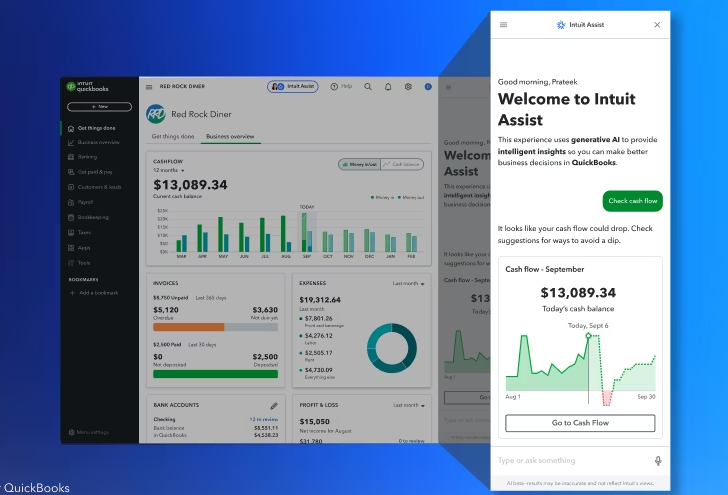Quickbooks is an accounting software designed to assist businesses with managing their finances and keeping track of financial transactions. With over 2 million users worldwide, it has become a popular tool for both individuals and companies alike. In this blog post, we will explore the best uses for Quickbooks and its most popular features, as well as providing a quick tutorial for those who are new to the software.
The Best Uses for Quickbooks
Quickbooks can be used for a variety of tasks, but it is primarily used for accounting and financial management. It allows users to efficiently manage invoices, track expenses and profits, create reports, and even process payroll. Let's dive into the top uses for QB in more detail.
1. Accounting and Bookkeeping
One of the main reasons why businesses choose to use Quickbooks (QB) is for its accounting and bookkeeping capabilities. It allows users to easily track financial transactions, such as sales, expenses, and payments, all in one place. This not only saves time but also reduces the risk of human error that can occur when handling finances manually.
2. Invoicing and Payment Processing

Quickbooks also makes the invoicing process much simpler and more efficient. Users can create professional-looking invoices, send them to clients or customers, and even track when payments are due. It also allows for online payment processing, making it easier for businesses to receive payments in a timely manner.
3. Budgeting and Forecasting
Another great feature of QB is its budgeting and forecasting tools. Users can create budgets based on their projected income and expenses, allowing for better financial planning. The software also has the ability to generate reports that provide insight into a business's financial performance, helping with future decision making.
4. Inventory Management
For businesses that sell products, Quickbooks offers inventory management capabilities. This allows users to easily track product quantities and sales, making it easier to restock when needed. With real-time inventory tracking, businesses can avoid stock shortages or overstocking which can have a significant impact on their finances.
5. Payroll Processing
Quickbooks also has a payroll feature that makes processing employee payments more efficient. It automatically calculates taxes and deductions, generates pay stubs, and can even handle direct deposits. This not only saves time but also reduces the risk of errors that can occur during manual payroll processing.

Quickbooks Tutorial
With its user-friendly interface and powerful features, Quickbooks (QB) has become the go-to choice for bookkeeping and financial management. We will guide you through the basics of using Intuit Quickbooks, as well as some advanced tips and tricks to help you streamline your business finances.
Getting Started
To begin using QB, you will need to choose the appropriate version for your business. There are several options available, including Quickbooks Online, Quickbooks Desktop and Quickbooks Self-Employed. Each version offers different features and pricing plans, so it is important to research and select the one that best fits your needs.
Once you have selected your version, you will need to create an account and set up your company information. This includes entering your business name, address, industry, and tax information. You also have the option to connect your bank accounts and credit cards for seamless financial tracking.
Navigating the Dashboard
The dashboard is where you will find all your important business information at a glance. This includes your account balances, income and expenses, invoices and payments, and more. You can customize the dashboard to display the specific data that is most relevant to your business.

Managing Your Finances
QB offers a variety of tools to help you manage your finances efficiently. From creating and sending invoices, tracking income and expenses, to generating reports for tax purposes, this software has got you covered. You can also set up recurring payments and automatic reminders for overdue invoices, making it easier to stay on top of your cash flow.
Integrating with Other Apps
One of the biggest advantages of using Intuit Quickbooks is its ability to integrate with other popular business apps. This includes PayPal, Stripe, Shopify, and more. By syncing these apps with your QB account, you can easily import transactions and data to streamline your financial management process even further.
Staying Compliant
Intuit Quickbooks also offers features to help you stay compliant with tax laws and regulations. This includes automatic calculation of sales tax, generating and filing 1099 forms for contractors, and tracking deductions for expenses like mileage and home office use. These features save time and reduce the risk of errors when it comes to tax season.
Troubleshooting and Support
If you encounter any issues while using Intuit QB, there is a wealth of resources available to help you. The support center offers tutorials, videos, and forums for troubleshooting common problems. Additionally, you can reach out to their customer service team for personalized assistance.
Jobs That Use Quickbooks
QB is widely used across various industries, but some of the most prevalent jobs that use the software include:
- Accountants and Bookkeepers
- Small business owners
- Freelancers and self-employed individuals
- Office administrators
- Non-profit organizations
Conclusion
In conclusion, Quickbooks is a powerful tool that can greatly benefit businesses of all sizes. Its accounting and financial management capabilities, along with its various features such as invoicing, budgeting, and payroll processing, make it an essential tool for any business looking to maximize efficiency in their finances. With this tutorial and the information provided on the best uses for QB, you can start using the software with confidence and take your business to new heights. Happy bookkeeping! So, if you're looking to streamline your financial processes and increase efficiency in your business, give Quickbooks a try. With its user-friendly interface and various features, it's no wonder why it's become one of the most popular accounting software on the market.
- https://quickbooks.intuit.com/learn-support/en-us/getting-started-with-quickbooks/top-reasons-to-use-quickbooks-online/00/185620
- https://www.business.org/finance/accounting/best-invoicing-software/
- https://www.fundera.com/blog/payroll-software-for-small-business
- https://www.businessnewsdaily.com/7548-choosing-accounting-software.html
- https://www.fool.com/the-blueprint/quickbooks-online-review/

Visualizing Your Path to Becoming a Data Analyst
Are you a job seeker or someone looking to transition careers? Do you want a well-paying desk job with a relatively low barrier to entry? Becoming a data analyst might just be the perfect choice…
Read More

Tips for Benefits and Salary Negotiation That Will Get You What You Deserve
Whether entering the job market for the first time or seeking a new opportunity, the interview process can be both thrilling and nerve-wracking. Among the many challenges job seekers face, negotiating pay and benefits stands…
Read More

Retirement Age and Planning in 2024: A Comprehensive Guide
A comfortable retirement is the ultimate goal for many employees, but achieving this dream requires careful planning and financial savvy. With the economic landscape continuously evolving, understanding what it takes to retire on time and…
Read More

Mastering the Art of Interview Questions for Employers and Candidates
The interview is the pivotal moment of truth in any hiring process. For interviewers, asking the right questions can reveal the true character of a candidate, while for job seekers, answering these queries can determine…
Read More


